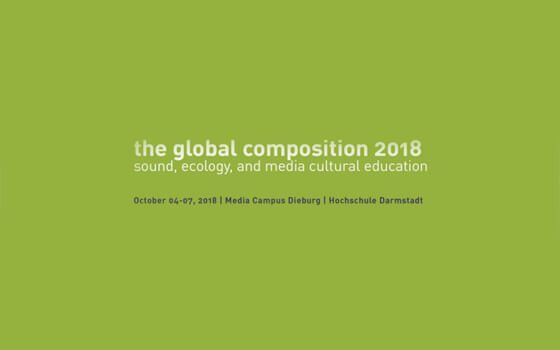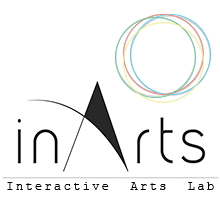The Global Composition 2018: Sound, Ecology, and Media Aesthetic Education - Call for Submissions
18-04-2018 11:33
The Global Composition 2018
Sound, Ecology, and Media Aesthetic Education
4-7 October 2018 at Media Campus Dieburg/Darmstadt UAS h_da
Organized by h_da’s Research Center for Digital Communication and Media Innovation (DKMI) in collaboration with GFTN e.V./Darmstadt, Master’s program International Media Cultural Work and World Forum for Acoustic Ecology.
Conference Chair: Prof. Sabine Breitsameter
Keynote-Speakers:
Prof. Dr. Milena Droumeva, Simon Fraser University, Burnaby/Canada
Walter Tilgner, Bio-Acoustician, Allensbach/Germany
Further Keynote-Speakers will be announced soon.
Soundscape Studies’ and Acoustic Ecology’s history has been connected to educational concepts since its beginning. A central thesis raised in R. Murray Schafer’s Acoustic Ecology is that a society’s willingness and ability to listen correlates to the quality of its sonic environment, signifying the overall relevance a community assigns to the realm of the auditory. Educational and facilitation concepts are therefore at the “logical” core of Acoustic Ecology, as they aim to broaden and sensitize auditory perception and apperception, and by this stimulate a sound oriented critical faculty and ingenuity.
Schafer’s “Ear Cleaning”, his concept of “Soundwalks”, his workshops combining listening and sound creation, especially for schoolchildren, became the starting points for numerous further educational and enlightening concepts within the realm of soundscape. Practically all of them seek to emancipate the contemporary ear from the restricted and deprived auditory patterns of the everyday or the specialized, and sometimes normative listening methods of musical fashions and traditions. Many, if not most of them received tremendous responses by their participants. These active and experiential exercises have been gaining more and more acknowledgement; not only for auditory empowerment, but for reclaiming sensual awareness, engaging a broader public leading to an overall increase in aural acuity.
Media, from audio media to the audiovisual up to interactive media and virtual reality, play a crucial role in almost any listening educational and facilitating approach, be it as an object of critical perception, a technical tool, an environment in which one can become creatively active, or in absentia. Therefore, listening and its manifold relations to media culture and media aesthetic education will be in the focus of the Global Composition conference 2018.
Within the framework of this conference, we encourage submissions to go beyond notions which identify education merely as schooling, the instruction of a subject mastery, but understand it as implying to a large extent individual and communal maturation aspects as well as aspects of the formation and strengthening of a personality, group or culture. In this sense, the Latin root of education, educere means to lead forth.
Our call for submissions invites suggestions for papers, posters, discussion panels, workshops, and artistic productions, focusing on the theme of “Sound, Ecology and Media Aesthetic Education”. Next-generation researchers under 35 years of age are especially encouraged to submit, and will be provided a special space to highlight their presentations.
Submissions to “The Global Composition 2018. Sound, Ecology, and Media Cultural Education” are welcome but not restricted to the following themes:
1. Ecological awareness and the furthering of listening
2. Listening, and the ecology of the senses
3. Media critique and listening
4. Methods and notions of listening
5. Educational approaches based on soundscape listening
6. Intercultural and diversity based approaches to soundscape and Acoustic ecology facilitation
7. Acoustic Ecology, media culture and gender
8. Further developments of soundscape and Acoustic Ecology facilitation in order to meet recent or future necessities and desiderata
9. Experiences with official curricula of soundscape and/or Acoustic Ecology educationin educational institutions
10. Auditory media aesthetic education for the elderly/for socially marginalized groups
11. Soundscape education/facilitation for youths between the age of 12 and 20
12. Sound(scape) design in media and urban space, and its influence on the furthering of a listening culture
13. Soundscape’s role in media culture and cultural media
14. Strategic cultural aspects of listening in media aesthetic education
15. Aspects of politics in soundscape education/facilitation
16. New audio technologies and Augmented/Virtual Reality as facilitators of auditory awareness
17. Critique and perspectives of the technologisation of listening/soundmaking in respect to an auditory media culture
The deadline for submission is 20 May 2018, 8 p.m. CEST via:
https://easychair.org/conferences/?conf=tgc2018
Please, remember that our selection process is based on the principle double blind peerreview. Therefore, you are kindly asked to make sure your name and identifying referencesare left out of the text of your submission.
We found the following hints helpful for writing a good proposal:
https://www.uaces.org/resources/how-to-write-a-good-abstract-for-a-conference-paper
See more: international-media-culture.eu
Back


